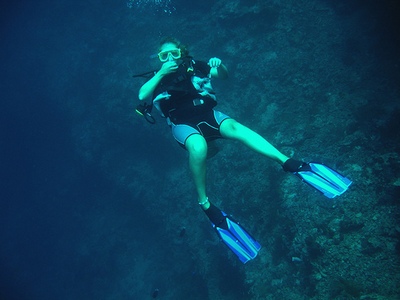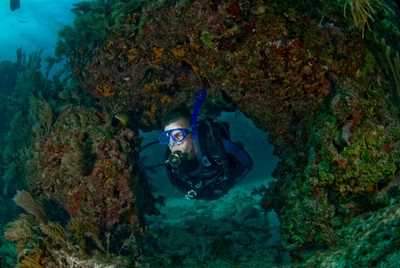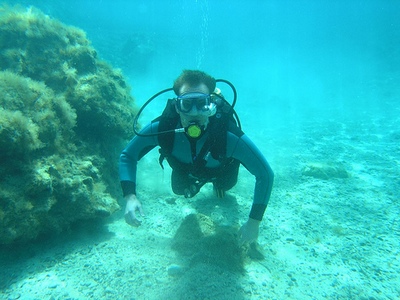
Scuba diving is one the most interesting and popular activities nowadays. People all over the world are eager to scuba dive to admire the mysterious world that is hidden under the water, untouched by humans.
Like all extreme activities, scuba diving also has its difficulties and dangers. So, I think that before diving into the deep mysterious waters, you should learn what dangers you may run into and how you can avoid and overcome them.
It is worth stressing, that scuba diving today has become much safer than it was a dozen years ago. Both the diving equipments and conditions have greatly improved, making your dive much more enjoyable and secure. However you still may come across dangers while diving. I want to point out some of them.
Let me firstly speak about the dangers that are connected with the marine world. Some people think that sharks are the main danger of all scuba divers. However, this point of view is not right. Shark attacks on scuba divers are extremely rare. If the divers dive in the safe areas no shark attacks will take place.
While diving, avoid touching walls and coral reefs. You may get poisoned by unknown water-plants and animals. In case you get scratched or stung by some fish or animal, stop diving and ascend to the surface, even in case of a slight pain. Turn to the doctor’s help to prevent further problems.

If you are a starter, take an experienced buddy with you for the first several times. They are already familiar with the aggressive animals and poisonous plants and will protect you from such dangers.
Most part of the accidents while diving is connected with the diver and the changes that occur in his organism. Barotrauma is perhaps the most common injury the divers have. Barotrauma is the injury caused to the tissues (that have air spaces between them) because of the pressure changes. So what exactly happens to a diver?
Now look. You have probably climbed up a mountain, haven’t you? You have perhaps felt that while climbing up the hill it becomes more and more difficult to breathe, because the air is denser up there. Or why do the astronauts wear their special equipments? Because there is absolutely no pressure in space and people can’t breathe at all.
Now the same is with the underwater. As the water is denser than the air, the deeper you go into it, the more pressure you experience. This very thing causes barotrauma. Barotrauma under the water may lead to crucial consequences. Your ears, lungs, chest cavity, stomach and other organs that contain air may be affected by barotrauma.
Before descending, the most experienced divers pop and clear their ears, thus equalizing the inside and outside pressures of the middle ear.

The speed of descending and ascending should be taken into serious consideration. If you descend and ascend too fast, your lungs may get over-expanded, which will lead to serious health problems, disabilities, even to death. Because of a fluid build-up in the lungs, you may suffer from pneumonia. Consider these things, before diving into the water.
Decompression sickness is also a common thing among divers. This is again connected with the descending and ascending speed. If you descend and ascend too quickly, bubbles will be formed in your blood, which will lead you to decompression sickness. The middle-aged divers come across this problem this problem more often than the young ones. The young organisms easily adapt to these changes.
Have you ever heard about “Martini’s Law” in scuba diving? The law says that every 50 feet dived in the water is equal to a bottle of Martini on an empty stomach. This, of course, means that deep diving can be very dangerous. Imagine how intoxicated a 200-250 feet dived human may become.

This type of injury is called nitrogen narcosis. The most dangerous thing in nitrogen narcosis is that you often do not feel that you are being intoxicated. You feel very well: not a single sign of weakness. Everything happens within a second, and the diver becomes incapable of doing anything.
Fortunately, nitrogen narcosis is not as common as barotrauma or decompression sickness, as not many divers decide on such a deep dive.
There are also many other dangers you may come across in course of your dive. Before starting to scuba dive, I advise you to learn as much about the underwater life as you can. Your knowledge will help you greatly find solutions in difficult situations.
As you see, the dangers of scuba diving are mostly controllable. As I have already mentioned, it has never been safer to scuba dive than it is today. The only thing you should do is to be a responsible diver, by staying healthy, wearing a safe equipment and reacting quickly in unpredictable situations.
All these underwater dangers demand prudence, caution and watchfulness, but as for me, no dangers are worth giving up scuba diving.